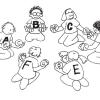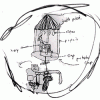Search Results
Showing results 1 to 12 of 12

A-Mazing Robot
Source Institutions
This activity lets you program your 'robot' (a willing friend) to pick up and dispose of some 'toxic waste' using as few commands as possible.

Clap Sensor: Build a Sound Sensor Using a Pico Cricket
Source Institutions
This activity requires a Pico Cricket (tiny computer). Learners work on designing and building a sound sensor out of household materials, like plastic wrap and cardboard.

Artificial Intelligence: The Intelligent Piece of Paper
Source Institutions
This activity explores what it means for a computer to be intelligent and introduces the topic of what a computer program is and how everything computers do simply involves following instructions writ

Metal Heads
Source Institutions
Pairs of learners play the roles of programmer and robot. The programmer gives specific directions to the robot to accomplish a simple task (e.g. walk across the room and pick up a pencil).

The Orange Game: Routing and Deadlock in Networks
Source Institutions
When a lot of people share one network (such as cars using roads, or messages getting through the Internet), there is the possibility that competing processes will create a “deadlock," or an interrupt

Magic Lanterns
Source Institutions
A magic lantern is a light that projects an image onto a screen.

Beat the Clock: Sorting Networks
Source Institutions
Even fast computers are limited to how quickly they can solve problems. One way to speed things up is to use several computers at once.

Wandering Wands
Source Institutions
In this activity, learners construct wands that play different notes depending on information from light sensors programmed via a PICO Cricket.

Peanut Butter and Jelly Robot
Source Institutions
This is an activity about robotics programming. Learners will discover how precise programmers have to be as they instruct a friend to make a peanut butter and jelly sandwich.

Art Cars
Source Institutions
In this activity, learners design miniature cars. Learners can create a telephone car, soccer car, merry-go-round car, or any other theme car they can imagine.

Night Lights
Source Institutions
In this activity, learners create night lights using a plastic cup, programmable PICO Cricket, tri-color LED, and sensor.

Push Pull Painter
Source Institutions
In this activity, learners create painting machines that can paint moving forwards and backwards.
